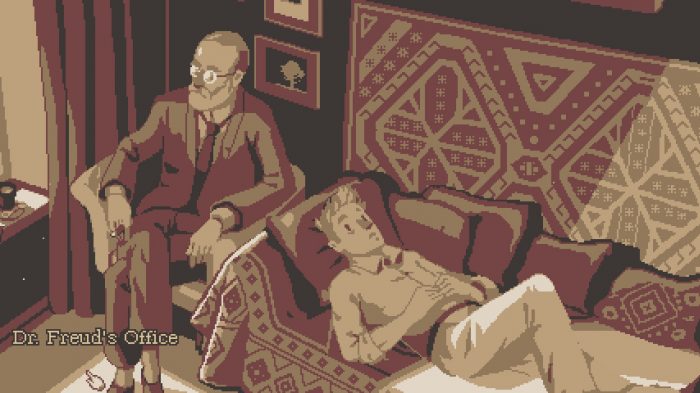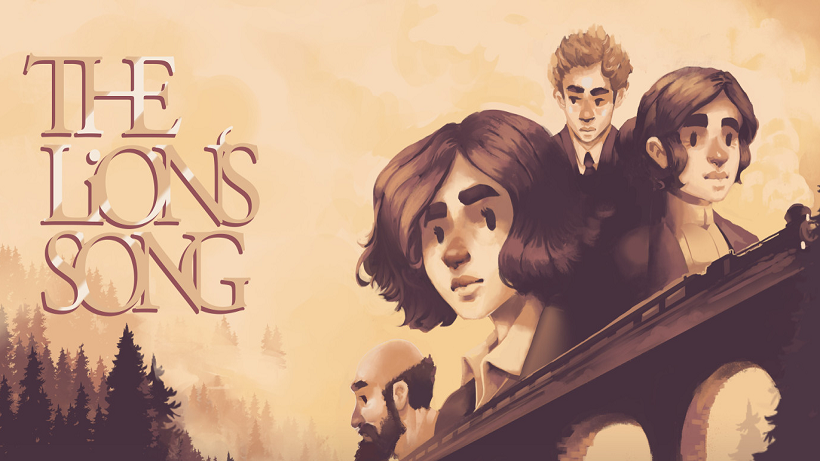Can you hear it?
We all struggle in our daily lives as we strive to achieve our goals, whatever that might be. The Lion’s Song is about said struggles and puts us into the shoes of four separate individuals who reside in Vienna, Austria in the early 20th century. For a video game, you won’t find any Earth changing actions taking place, but you will experience one of the most gratifying intimate stories currently found in this medium.

To tell its separate stories The Lion’s Song utilises an episodic approach – conveniently bundled as a single package for the Switch – which breaks up the experience and gives each story enough attention it deserves, whilst also enabling some plot elements to either overlap act as reference points in other episodes. The intention of the developers was originally to make each episode relatively short, taking around 20-30 minutes to finish. This was followed through with the first episode, but the following two episodes abandoned this, with both going over the hour mark. Yet this feels like a necessary change as these two episodes greatly benefitted from the additional time spent with characters Franz Markert and Emma Recniczek without seeming like being dragged out for the sake of it. The final episode returns to a shorter length – albeit still longer than episode 1 – and works well to balance out the overall experience.

The Lion’s Song plays out via a variation on the adventure game genre, and like with its episodic structure, is reminiscent of work by Telltale Games. This structure, however, is only used to underpin the game, rather than dictate how the story and gameplay unfold over the episodes. Each episode plays differently, not in the sense of different genre, but emphasising and deemphasising aspects of the adventure genre to suit the core story a given episode is trying to tell. Some episodes play out more like a visual novel whilst others feature simple point&click style puzzles. The advantage of this approach is that the form of interactivity used never feels gimmicky and always serves the purpose of engaging with the narrative.
There is one other element that ultimately plays out like a Telltale game, and that is at the end of each episode you are greeted with a breakdown of the choices you made and how this reflects against other players, the difference here though is that you can then select which part you would like to replay. This provides a different variation of the now infamous “Clementine will remember that”. It is much less overt and allows you to play the game without trying to second-guess the impact of your decisions. It is enthralling to learn at the end of an episode of the alternative ways it can navigate towards its conclusion.
It can seem old hat now for an indie game to utilise a pixelart look, but that is a disservice to what has been achieved here. The sepia tone that is consistent throughout is a marvellous way of enveloping you as you explore 1910’s Vienna. The environments are wonderfully expressive despite embracing the relative simplicity that comes with pixelart. This also extends to the characters portrayed throughout which somehow are remarkably expressive, contributing greatly to the highs and lows that occur during your time with them. With the Episode 2 focusing on painter Franz Markert the developers have managed to convey the uniqueness of his artistic style, despite the limitations that arise from sticking pixelart; and one that purposefully utilises a limited colour palette as well.

The music is also worth noting, as it is one of the constant themes that play out across the game. The titular “Lion’s Song” is introduced in the first episode and composed by Wilma Dörfl as we see her struggle with loneliness as she tries to complete this piece of music. Episode 1 doesn’t exist in isolation, as each episode contributes to a wider expression of this depiction of Vienna, and The Lion’s Song is casually mentioned in the following episodes. It doesn’t just complement the overarching tone as it is a beautiful piece of music, as is the rest of the soundtrack.
The Lion’s Song’s story is the games’ main draw, as mentioned it is split into four separate episodes, each telling a unique story. Greatly contributing to the storytelling craft at play here is the subtle interweaving elements from different episodes that are present across the rest of the game. Episode’s 2 and 3 seem like they should have no direct connection – aside from obviously taking place in Vienna around the same time – but then suddenly there is a moment where the two merges, strengthening both episodes. This very moment can also be interpreted differently based upon the two lead characters of each respective episode. It’s a fascinating moment and one which could have just been a wink and nod to the player if it was implemented by less adept creators.
The first three episodes provide you with an insight into the lives of three rather different people during a trying period. Whilst each of the tribulations they face might not necessarily be ones that you the player could experience in your own life, you too feel the pain and the injustice that these characters fight through, but also sharing in the joy at overcoming these.

Episode 4, appropriately titled “Closure”, acts as both an epilogue but also a short prequel to one of the episodes. At first, this approach seems a bit clumsy, but ultimately it ties the whole experience together providing a strong cohesive and meaningful conclusion to the entire story; and by the end, you might even find yourself holding back tears.
The four episodes and their respective individuals face struggles achieving success in their craft, be it loneliness, self-doubt, discrimination, or familial burdens. These are all personal journey’s but contained within a larger concern that is addressed later. Ultimately it is a series of redemptive events, ones that encompass you. You want these characters to succeed, you need them to succeed.
The Lion's Song
Summary
The Lion’s Song is a masterful collection of independent yet interconnecting tales of individuals determination to succeed in their respective craft. This is accompanied by beautiful pixelart and the wonderful titular “Lion’s Song”. These tales will stay with you for some time.

